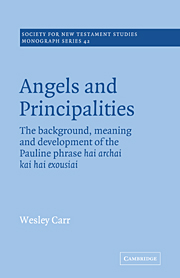 Angels and Principalities
Angels and Principalities Published online by Cambridge University Press: 06 January 2010
Romans 13: 1–7
The teaching of Paul in Rom. 13: 1–7 has been a central problem for the Christian Church throughout its existence. In the twentieth century, however, there has been a major revival of interest in the passage, partly through the influence of Dibelius and his thoughts on the angels of the nations and partly owing to the political upheavals in Europe, especially the problem caused in Germany by the rise of Hitler. The debate on the word ἐξουϭίαι in Rom. 13:1 has largely focused on the exegesis of Oscar Cullmann, to which attention must first be given.
Dibelius proposed a double reference for the word, which, he claimed, referred both to the actual human authorities and to spiritual forces that stood behind them. Cullmann has developed this and thus become the central figure in the debate. He expressed his views in Christus und die Zeit (1946) and The State in the New Testament (1956), with an important interim article, ‘Die neuesten Diskussion über die ἐξοϭίαι in Röm. 13: 1–7’. At the conclusion of this article he summarised his position:
‘The twofold interpretation of the ἐξουϭἰαι in Rom. 13, 1 as referring to the state and to the angel powers which stand behind it, is thoroughly justified as an hypothesis, from the standpoints of philosophy, Judaistic concepts, and the early Christian and Pauline theology. It is an hypothesis, and naturally we can never say with final certainty that Paul has in mind not only the secular sense of the word ἐξονσἰαι but also the meaning which he attributes to it in all other passages. I can only wish, however, that all other hypotheses which we necessarily must use in the field of NT science were as well grounded as this one.’
To save this book to your Kindle, first ensure [email protected] is added to your Approved Personal Document E-mail List under your Personal Document Settings on the Manage Your Content and Devices page of your Amazon account. Then enter the ‘name’ part of your Kindle email address below. Find out more about saving to your Kindle.
Note you can select to save to either the @free.kindle.com or @kindle.com variations. ‘@free.kindle.com’ emails are free but can only be saved to your device when it is connected to wi-fi. ‘@kindle.com’ emails can be delivered even when you are not connected to wi-fi, but note that service fees apply.
Find out more about the Kindle Personal Document Service.
To save content items to your account, please confirm that you agree to abide by our usage policies. If this is the first time you use this feature, you will be asked to authorise Cambridge Core to connect with your account. Find out more about saving content to Dropbox.
To save content items to your account, please confirm that you agree to abide by our usage policies. If this is the first time you use this feature, you will be asked to authorise Cambridge Core to connect with your account. Find out more about saving content to Google Drive.